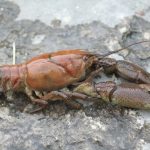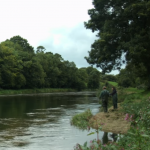All water users are being urged to take precautions after…
Children are wildlife competition winners at Clonmel Applefest
Last years Clonmel Applefest had a special focus on water quality and the River Suir. Information stands included Healthy Ireland, The Local Authority Waters Programme (LAWPRO), Suircan, Clonmel Repair Café and Toastmasters amongst others located along the river bank in Clonmel.
Winners of a wildlife competition held at the last Clonmel Applefest, were given prizes in the Tipperary County Council Chamber in Clonmel. Winners included Amelia Zembrzycka, Oisin O’Flynn, Benjamin Btaszczyk and Gráinne Kelly.
It is important that people have a meaningful input to the management and protection of our precious water resources in Clonmel and Co Tipperary.
Dr. Fran Igoe (LAWPRO Southern Regional Coordinator) answered questions on the river, the aquatic life and what we all can do to protect it. People were particularly interested in dealing with invasive species which impact on the river and a large illustrated map was available inviting people to submit records.
“We aim to map the locations of the three most invasive plant species (Himalayan balsam, Giant Hogweed and Japanese knotweed) in the Suir River catchment with the assistance of the public and build on the work by volunteers from Suircan, visiting students on the EIL programme and Tipperary Co Council to control and prevent their spread along the Suir Blueway”
Fran Igoe, LAWPRO Southern Regional Coordinator
This will form the basis for a larger invasive species strategy in 2020 along the river.
Interest from the public was very encouraging and we had a lot of visitors from Dublin who also wanted to know how they could get involved in improving water quality in their own counties. So the conversation took on a national dimension as well as a local dimension during the day and also an international dimension with visitors to the information stand from the UK, Spain and Poland also joining in the discussions. Issues raised by the public also included the need to protect our native crayfish from the crayfish plague disease and ensuing that our land management practices don’t damage the fragile web of life in the River Suir and the important fisheries it supports.
Fran Igoe, LAWPRO Southern Regional Coordinator











